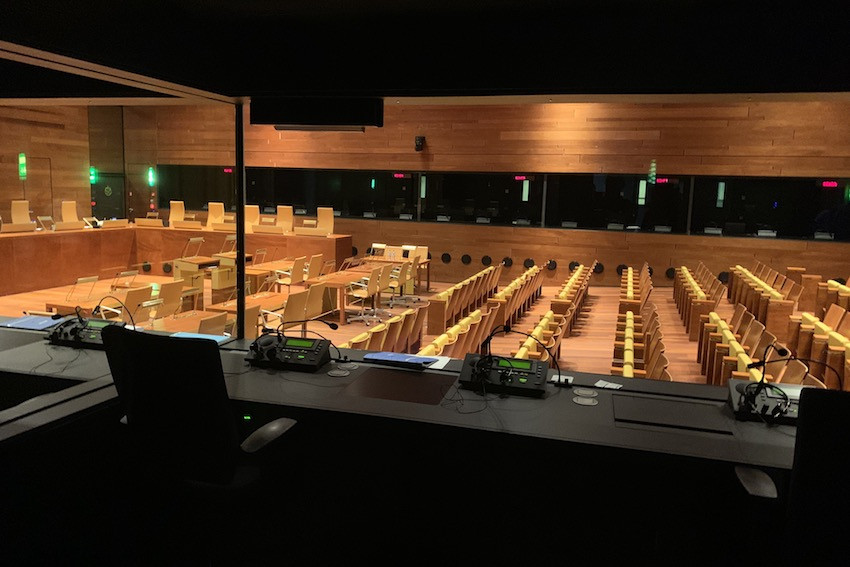Among the moves to contain covid-19 transmission: the European Parliament has banned French cross-border commuters from coming into the office, the European Court of Justice has encouraged staff who can to telecommute, and the European Court of Auditors has shuttered its HQ.
European Commission
The European Commission introduced a telecommuting plan for “all commission staff not in critical positions,” a spokesman said on Thursday. “Staff ensuring continuity of service will work in two independent shifts. So far, almost a third of the workforce [in Luxembourg], about 9,000 people, have already been teleworking,” the European Commission spokesman stated.
European Court of Auditors
“Visitors are denied access to ECA premises as of 12 March 2020,” a spokesman told Delano on Thursday. “Staff are recommended to telework, i.e., work from home, until further notice.”
The ECA rep said all professional travel to “red areas or clusters” was off and “all non-essential professional travel has been cancelled”. The ECA told staff that “all private travel to red areas and clusters is strongly discouraged” and “all non-essential internal meetings, events and professional trainings have been postponed”.
The spokesman said on 12 March: “No cases of coronavirus have been confirmed among the approximately 950 ECA staff.”
The spokesman subsequently said, on Friday morning, that, “as of Monday 16 March 2020, it will be compulsory for all ECA staff in non-critical functions to telework.”
European Court of Justice
A spokesman for the European Court of Justice said the ECJ would try to have the minimum staff onsite to guarantee that judicial hearings could continue, but that other staff should telecommute. “The instructions given by the court essentially mean that as far as possible anybody whose work can be performed from outside the premises of the court does so,” the spokesman told Delano on Thursday.
Staff still working at the judicial complex in Kirchberg include judges, registry officials, advocates general, interpreters, “and in the case of the judges their support staff which for the purposes of a hearing can be kept to a bare minimum,” he stated. “In all other cases the court has actively encouraged telework and this has the effect that a large part of the workforce--that amounts to around 2,300 employees--will be on ‘teletravaille’ until further notice.”
The rep could not give a precise breakdown, as the decision to telecommute or not has been taken separately by each department. But, the ECJ spokesman said, “the policy applies across the board to all employees,” regardless of where they live.
European Investment Bank
The European Investment Bank learned on Wednesday evening that a staff member was infected with covid-19, a spokeswoman said on Thursday. The employee and their immediate colleagues are all working from home. Staff members with pre-existing medical conditions were allowed to work remotely beginning on Tuesday, she stated.
Next week, the EIB will trial teleworking for all staff in two tranches: half will work at EIB offices, while the other half will telecommute. They will switch after offices have been disinfected. The exact timing of the rotations will be announced.
Updated 14 March, 8am: Nearly all EIB staff will telecommute starting on Monday. The shift came after covid-19 was recognised as a pandemic by world health authorities and confirmation that a staff member was infected, an EIB spokeswoman said on Friday afternoon. There has only been one case among EIB employees, despite rumors otherwise, she stated. A skeleton staff of critical personnel, notably IT team members, will continue to work at the office.
The EIB employs 3,630 people in Luxembourg (including the European Investment Fund, but not including contractors and sub-contractors).
European Parliament
“As a general rule, people feeling unwell are advised to stay home and requested to seek advice from their general practitioner,” a European Parliament spokeswoman told Delano on 12 March. “In addition, EP authorities are also requesting staff who travelled to one of these areas within the last 14 days [to] stay at home and telework--they are invited to monitor their health and temperature.”
Starting Monday 16 March, “teleworking is suggested for all staff whose physical presence in parliament is not absolutely indispensable.” About two-thirds of its translation staff had already started working from home on 2 March and staff with pre-existing medical conditions were told they could telecommute on 8 March.
As of 12 March, EP employees living in the French region of Grand Est (which includes Metz and Strasbourg) have been told they should work remotely. The EP spokeswoman said: “It has an impact on [the] Luxembourg site, due to the high number of staff coming from Grand Est, only some buildings will remain open and an important percentage of the staff is invited to telework.” She added: “the teleworking measure applies to all staff living in the Grand Est region but also the staff who have been to any other affected regions.”
The European Parliament employs around 2,100 staff in the grand duchy.
European schools
“The European schools have decided to suspend compulsory school attendance by pupils and to suspend in situ lessons in all European schools, from Monday 16 March until 29 March,” the European Commission spokesman said on Thursday. “European schools in Luxembourg had already banned [on Wednesday] students from the French cross-border region of the Grand Est after this region was classified as high risk,” he stated.
Delano also asked Eurostat to comment.
If you suspect that you have covid-19, isolate yourself from anyone susceptible to be infected and contact the government hotline, 8002 8080. Do not go to your see your GP or the emergency room. In case of emergency, telephone 112. For more information and the latest official updates, consult the Luxembourg government’s coronavirus information website. Additional information about covid-19 can be found on the websites of the UK’s National Health Service, US Centers for Disease Control and Prevention and World Health Organization.
